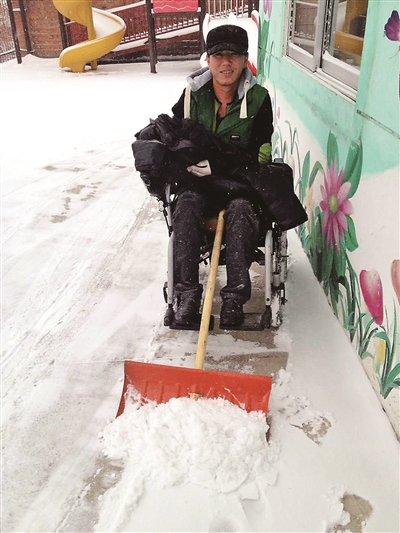Victim seeks public awareness of nuclear radiation
- By Chen Xia
 0 Comment(s)
0 Comment(s) Print
Print E-mail China.org.cn, February 1, 2018
E-mail China.org.cn, February 1, 2018
On Jan. 21, China's first nuclear radiation victim Song Xuewen went to Beijing for further treatment.

When he found small piece of metal by chance 22 years ago, he never expected that his life would change completely.
Song was born in 1976 in a poor farmer's family in northeast China's Jilin Province. In 1996, he worked in a local construction company under a large chemical group.
On Jan. 5 of that year, Song discovered a piece of metal in the snow while walking around the company's compound. He thought it was a keychain lost by a colleague, but didn't find its owner on site, so he put it in his pocket, hoping to find the owner later.
However, two hours after he first picked up the metal, he fell sick, and his condition deteriorated quickly. He vomited every few minutes, and lost consciousness before being rushed to the hospital.
Later, Song was told that the metal he put in his pocket was actually Iridium-192, a strong gamma ray emitter, which is highly radioactive and can damage human organs.
The metal was misplaced by one of the company's technicians. They had been using it to detect leaks in the company's pipeline, but forgot to remove it when they were finished.
The day after Song put the metal in his pocket, he was sent to Beijing for treatment.
In the following two years, he underwent seven operations, in which he lost two legs, his left forearm and parts of the fingers on his right hand. His internal organs were also damaged.
In the initial days after the accident, Song felt depressed and sad. He hid in his room every day with the curtains closed.
But in those dark days, Song met a young nurse who didn't mind his poor health and quit her job just to take care of him.
In 2000, Song received a compensation of some 480,000 yuan from his employer and the company that lost the metal. With the money, he finally got artificial limbs, which enabled him to take care of himself and do some simple housework.
In 2004, Song published a novel based on his experience. The book contained 470,000 words and was titled "The Chain of Life and Death."
"The moment I picked up that small metal chain, my life changed completely," Song wrote.
In 2006, Song married his longtime girlfriend. In 2008, the couple opened a nursery in Song's hometown to make a living.
At the end of 2016, Song's health suddenly worsened, and he began to vomit blood. Last year, he was diagnosed with more than 10 diseases, including amnesia and cirrhosis. He also had serious heart trouble.
Unfortunately, the nursery has never turned a profit, and Song had no other income aside from for a meager disability payment every month from the local government. To make ends meet, Song opened an online shop to sell rice last October.
"Life is difficult, but I can't stay here doing nothing. I must try my best," Song said in an interview with the Beijing Youth Daily.
After his story was reported, he received some charitable donations from readers, and could finally seek further treatment at the hospital.
"Doctors once told me that I couldn't live to the age of 40, but now I'm 41," Song said in another interview with the newspaper Beijing News. "I wish I could live longer so that I can spend more time with my son."
Song and his wife had the baby two years ago, which was almost a miracle, as doctors had warned him that the radiation might leave him permanently infertile.
With his baby and the public donations, Song said he has regained some confidence in his life. "There are so many people who are so kind to me. I need to do something for them in return," Song said. "I'm feeling stronger now."
Besides receiving treatment at the hospital, Song is now seeking to raise public awareness of nuclear radiation's harms.
"Previously, I tried to conceal nuclear radiation's harm to my body and the fear it caused me," Song said in an interview with the Beijing-based newspaper Legal Evening Post. "But the truth is, it never stops harming me, and there is no cure."
"It's like an evil claw," Song continued. "You don't know when it will reach which part of your body. In the past two decades, I have been constantly gripped by fear."
"Now, I'm trying to help other people with similar experiences. I hope that through our efforts, more charity groups can pay attention to nuclear radiation victims. And I also hope improvements can be made to social security programs," Song said.






Go to Forum >>0 Comment(s)